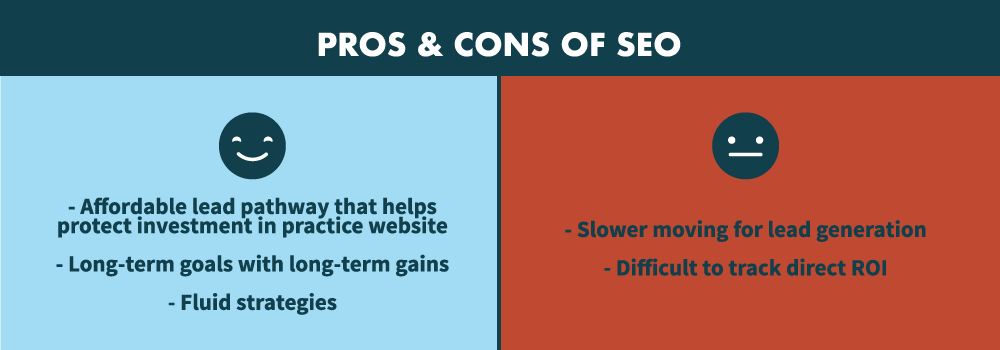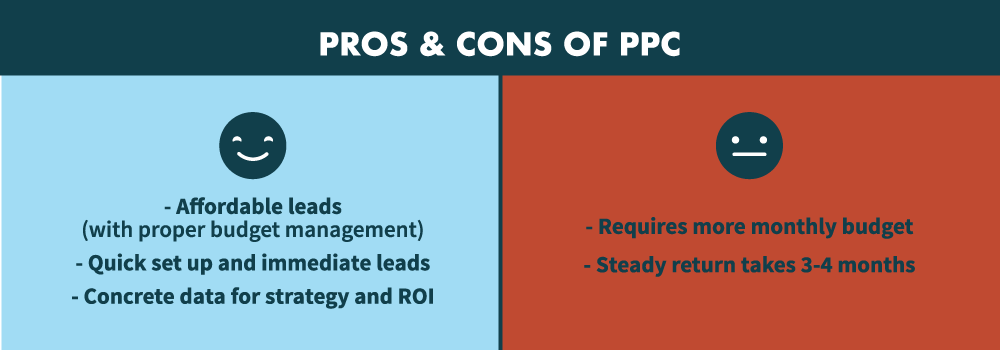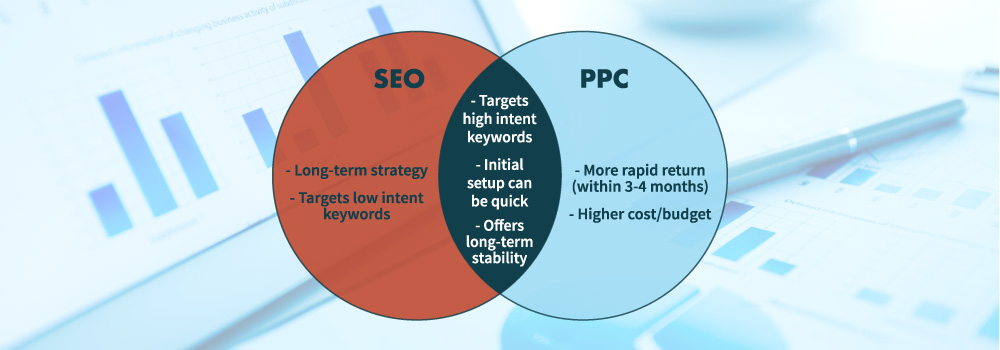Online marketing is a growing necessity, especially for local businesses like dental practices, and we don’t expect this trend to reverse. While patient referrals, mailers, and insurance participation can provide the bulk of new-patient flow for some practices, we believe that no comprehensive dental marketing plan is complete without inbound digital channels such as SEO (search engine optimization) and PPC (pay-per-click). Your goals for new patients and your marketing budget will determine whether PPC, SEO, or both are the right marketing avenues for your practice at this time.
So… What is SEO?
SEO stands for search engine optimization. It is a form of passive online marketing that aims to improve and promote a website to increase the number of visitors through organic search. A more optimized website gains better organic search rankings (meaning search listings outside of paid ads), and better rankings mean more website traffic to convert to appointments. You want information about your dental practice to be readily available to potential patients and returning patients at all stages of the “buying” process. More on that later.
“Is my SEO good?”
This is sort of an abstract question with no real cut-and-dried answer. A better question is: To what degree is your SEO doing its job? If you’re tracking new patient sources (which you should be) and you can confirm that you’re getting enough appointments from online sources each month to support your business goals, then your SEO might indeed be good enough for your practice, at least for the time being. Having said that, it’s important to remember that SEO is a long-term strategy. Without some level of ongoing SEO efforts for your dental website, the site will stagnate and eventually develop errors that can hurt you in local search. On the web, things are always moving ahead. There’s no staying still in this current—you’re either pushing forward or you’re falling behind. Don’t be the dentist who’s falling behind!
The good news about most of these dental SEO components is that you and your SEO team have a significant level of control over them. What your SEO team can’t control, of course, is your dental office’s physical location and its competition both on the ground and online. If you’re still in the planning phase of a start-up or you’re looking to purchase an existing dental practice, please conduct demographic research and consult with experts to help you understand your opportunities as well as the competition! Among everything else that it affects, your office location will heavily impact your offline and online marketing endeavors. If you already have a practice location but want to understand it better so you can maximize your opportunities, a dental demographic report can help.
DEMOGRAPHIC FAQSWhat to Expect from a Worthwhile SEO Program
You shouldn’t have to become a digital marketing expert before you can understand and coordinate your dental practice’s digital campaigns. Make sure that your SEO program regularly provides you with information and data that are both transparent and easy to digest. If the reported info seems too complicated and you can’t get anyone to break it down for you or answer your questions, there might be some underperforming (or simply under-executed) portions of your campaigns that they don’t want you to notice. Ask questions until you feel like you have a good grasp of what’s being done and how it’s working. Most dental SEO programs start between $500-$750 per month. Learn more about the details and costs of online dental marketing.
Why High AND Low Intent Keywords?

Informational and navigational searches are what we consider “low intent” keywords. “High intent” keywords are those more likely to have immediate transactional or commercial intent, meaning people who search them are more likely to convert to a new patient lead now or in the near future. By creating campaigns for both high and low intent keywords, your SEO company helps with your brand’s top-of-mind awareness at every stage of the buying process or “sales funnel.” You want to be able to catch potential patients the day they’re looking to schedule an appointment, and you also want to be easily found by people researching potential dentists or desired treatment options for next month, 6 months from now, or even for next year. SEO enables you to cast a wide net with a lot of potential gains as time passes.
Examples of High Intent Keyword Searches:
- Dentist Near Me
- Dentist in “City”
- Dental Office
- Dentist Who Accepts “Insurance”
- Find a Dentist
Examples of Low Intent Keyword Searches:
- Overcoming Dental Anxiety
- What to do if Your Crown Comes Off
- Cost of Dental Implants
- What to do in a Dental Emergency
- Child’s First Dental Exam
High intent keywords target users who are likely to call and schedule an appointment the same day. Low intent keywords target users who are looking for dental related information or who may not be ready to book an appointment yet. Both high and low intent searchers are targeted by a well-rounded, humanistic SEO approach.
 CONTACT US ABOUT SEO
CONTACT US ABOUT SEO
What is PPC?
PPC is pay-per-click advertising. When you launch a pay-per-click campaign for your dental practice, you’re campaigning for your website by literally paying for clicks, or visits, to your site. By choosing a daily budget, you bid on placements for high intent keywords, auction-style. PPC enables you to draw in more website visitors based on specific web search queries that match what you have to offer in terms of your location and dental services. While it takes a PPC account some time to deliver a strong return (usually within 3-4 months), this digital marketing option often yields faster results with less prep time compared to SEO, which is more of a long-game approach.
What to Expect from a Worthwhile PPC Program
Just like with SEO, you want a dental PPC program that provides regular, transparent reporting with supporting explanations. You need to be able to understand the progress of your PPC campaigns without being a dental marketing expert. You want to know when your PPC is working; when it’s not working well enough, you want to understand what your team is doing to improve performance. At Practice Cafe, we recommend monthly dental PPC ad spends based on local competition and other factors, with most budget suggestions between $1,000-$2,500. You’ll likely see most PPC management fees between 25%-30% of ad spend. When talking to PPC agencies, whether specifically dental PPC companies or general digital marketing agencies, ask for a breakdown of the monthly charge, meaning how much will be allocated to actual ad spend and how much will pay for management fees. Learn more about the details and costs of online dental marketing.
Another performance indicator to look for from your dental PPC service is consistency. After the first 3-4 months, a properly built and expertly run dental PPC account should run like a pretty well-oiled machine. Daily keyword bid adjustments are still necessary, and regular modifications and additions to ad copy should still be happening, but the KPIs above (cost per click, conversion rate, and cost per conversion) should essentially stabilize. From month to month, there will be some fluctuation, especially during certain times of the year, but in general these metrics should fall within certain benchmark ranges. Unless your PPC account is being changed to advertise a completely new service or there’s a substantial budget change, you’ll know what to expect to see in your monthly reports on performance.
If you notice a lot of fluctuation or perceived inconsistency month to month, this could be an indication that your PPC service involves too much rapid change. Without enough time, there’s not enough data for a PPC team to make well-informed decisions about the trajectory of an account. Trying something new on a daily or weekly basis will often result in poor account performance because the data will not be clear enough to reveal the best strategy. When possible, it’s best to apply PPC changes in a measured, steady manner that preserves the integrity of the account.
Why Only High Intent Keywords?
Since your PPC company has the opportunity to actively bid on specific or “exact” keywords, the best use of these marketing dollars is to target only those keywords that are considered high intent, or those likely to produce an immediate patient lead. It’s more affordable to let your SEO efforts target people who are still in the exploratory part of the buying process, because with SEO you’re not paying for every click.
 CONTACT US ABOUT PPC
CONTACT US ABOUT PPC
Deciding Which Digital Marketing Program is Best for You

In most cases, a dental practice will maximize digital marketing success by investing in both SEO and PPC. Depending on your marketing budget and current patient numbers, you may not feel an urgent need for both services. Learn about the purposes, weigh the pros and cons, and consider the timelines for dental SEO and PPC to make a well-informed, confident decision for your practice’s dental marketing. If you have specific questions or you’d like a complimentary SEO audit of your current website, our team is here and happy to help! We can also offer budget recommendations for PPC services. On your journey to choosing a digital marketing agency, please let us know how we might be able to earn your business and bring your dental practice more success!
CONTACT US




